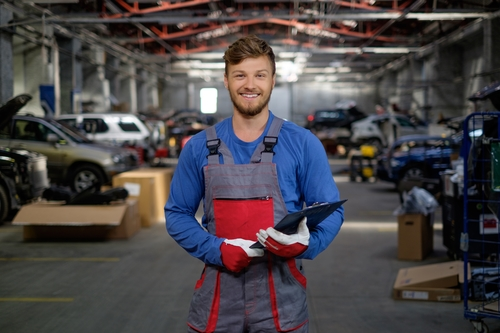Whether a vehicle is relatively new, old or used one thing’s for sure, it will need professional vehicle inspection at some point to ensure it’s not only roadworthy but ensures reliability and maximum performance.
Taking your car in for a thorough vehicle inspection at least twice a year, before summer and winter is the best way to ensure you have a properly working vehicle all through the year.
Nip car problems in the bud; The moment you realize that your vehicle isn’t working at its best, the first thing you should do is bring it to All Round Auto Repair to have a certified mechanic from a reputable auto repair shop take a look. Here we will scrutinize every nook and cranny of your vehicle to find out the root cause of its inadequate performance.
Make no mistake, doing this can potentially save you hundreds of dollars worth of extensive repairs down the road, so making routine inspection and maintenance a priority is definitely the financially responsible and smart and way to go about things.
Going Back To The Basics – Vehicle Inspection The Right Way And What You Should Expect
 Is your car taking a long time to start; Or is it uncharacteristically consuming fuel? If so, then it’s definitely time for a thorough vehicle inspection. To give you a good idea of what you can expect, here is a brief outline of the most important elements of a professional vehicle inspection.
Is your car taking a long time to start; Or is it uncharacteristically consuming fuel? If so, then it’s definitely time for a thorough vehicle inspection. To give you a good idea of what you can expect, here is a brief outline of the most important elements of a professional vehicle inspection.
Visual Inspection Of The Body
Inspecting the exterior of the vehicle or a visual inspection is usually the first order of business when a mechanic is conducting a vehicle inspection. Here the vehicle is examined to see how well the paint is holding up and if there are any scratches or dents that will need repair. It also involves checking for damage in:
- The body panels
- The bumper
- Doors
- Tailgates
- Lift-gates
- Grille
- Windshield
- Wiper-blades
- Side and rear window glass
- Exterior lights.
Checking The Tires
Apart from taking a look at the obvious, a good mechanic will also make checking tires and their pressure, a top priority of routine vehicle inspection. Did you know that if your tires don’t have the right pressure, it can affect your vehicle’s fuel efficiency and overall performance?
It sure can, so getting them checked with a pressure gauge to see if tires are underinflated and inspecting the depth of their treads for wear, making replacements where necessary is the best way to ensure your car’s dependability and consistent fuel efficiency.
Wheel-Alignment
This is also another important aspect of vehicle inspection and maintenance, and serves to center the steering wheel of vehicles if there is a difference found in the degrees of wear between the insides and outsides of tire-treads.
However, the alignment process mainly refers to an adjustment of a vehicle’s suspension – the system that connects a vehicle to its wheels not an adjustment of the tires or wheels themselves. This also includes an adjustment of wheel covers, springs, struts, and shocks.
Suspension
With the best of the best mechanics, a complete vehicle inspection will not fail to include an extensive look at your suspension, giving a good opportunity to identify any budding issues with the steering or suspension of the vehicle.
Checking the steering belt, steering fluid level, steering pumps as well as the shocks, struts, mounts and bushings and identifying any issues needing repair is also done to ensure optimal functionality.
Comprehensive Engine Inspection
This probably qualifies as one of the most important aspects of the vehicle inspection process. Here engine mounts, belts, wiring, hoses, lines and fittings all receive a thorough examination and critical components like the radiator, the cooling fan, the water pump and the cabin air filter system will all undergo testing to check for any inconsistencies.
Moreover, to guarantee optimal fuel efficiency particular attention is given to the fuel system, where the fuel filter and engine air filter are checked to ensure they’re operating normally.
But most importantly, an oil check and change are an essential part of engine inspection, since ensuring that a vehicle’s oil is to standard is paramount to the smooth operation of the vehicle.
Battery Check
This is pretty straightforward; The mechanic will check the battery to pinpoint any contributing factors to underperformance. Usually, this entails an assessment of water levels and the components of the electrical system including the starter operation and ignition system.
Brakes and Fluids
During the course of your vehicle inspection, inspecting the brakes and fluids will most definitely come as part of the package. The mechanic will take a look at the drum, brake pads and rotors to see if the brakes are working properly.
In addition, he will check the necessary fluids of your vehicle including brake fluids, engine oil, coolants and washer fluids to make sure they’re all up to standard.
Sounds like a lot to take on huh? Well, these are all important aspects of vehicle inspection, which are absolutely necessary and ought to be considered if vehicle owners are to help fight performance and safety issues, guaranteeing a sound and well-maintained vehicle.
Get the best rates and top-notch service when you bring your vehicle to All Round Auto Repair because we take absolute care of any vehicle that enters our shop. For more information you can also visit our website at allroundautorepair.com

